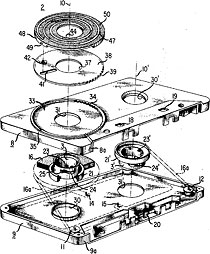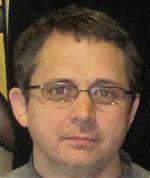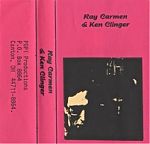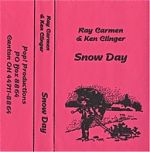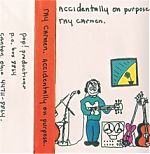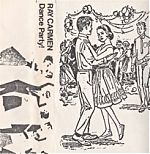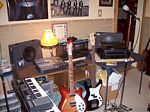Ray Carmen
I may have heard about Ray Carmen’s music by reading a review in Option or Sound Choice. That must have been about 1988. While much of the underground was concerned with noise, sound collage, improv and the like, Ray made no bones about his main concern: good old fashioned pop song. That being said, he also delved into more oblique forms as well but his take on verse and chorus was his forte. We traded many tapes and CDs and even collaborated on some very memorable tunes. Always a super nice fellow, courteous, generous and positive I have always considered Ray Carmen a friend even though I have never met, or even spoken to him. Such is the depth of this underground scene.
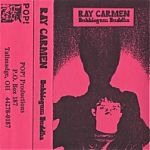
Above, his classic from 1993, “Bubblegum Buddha” which you can hear as a Tape Of The Month feature.
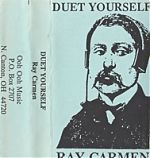
Ray Carmen has parsed his releases selectively over the years. He is not super prolific although over the years he has produced a fairly large body of work. His 1990 tape, “Duet Yourself”, above, is another feast of magisterial pop goodness.
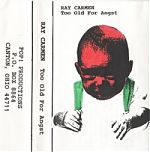
Above, the cover for “Too Old For Angst”, his 1997 release.
Ray’s own label “Pop! Productions” changed to “Cut And Paste” sometime in the early 2000’s. He also released material on GGE records, Emigre, Lonely Whistle and other labels.
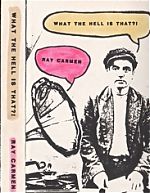
His “What The Hell Is That?” cassette, above, from 1987 contains many Carmen favorites including “ Dream Girl”, “Me And My Big Mouth”, “I’ll Get You For That”, “One Without The Other”…all songs that could probably be on anyone else’s “greatest hits” packages.
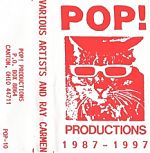
n addition to his own material Ray would also release music from other artists. Featured on the tape above, Ken Clinger, Don Campau, Rich Arithmetic, Lawrence Salvatore, James St. Vrrain, R. Stevie Moore, Ghost Rockets, Shane Faubert and Mayhem Steamroller. Side two includes an incredible greatest hits of his as well.
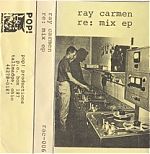
Another EP length release with 3 mixes of his tune, “Beckoning” and also an unreleased track “More Than Enough”.
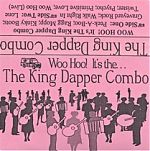
Ray also played drums for The King Dapper Combo ( and other Ohio outfits) and even released material by them such as the tape above.
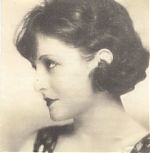
He also was a key member of Kinski Spiral which also featured Bob Ethington and Joe LaRose. Their CD, “Plays Silent Stars” from 2004 below. Ray has also gone on to produce many CD releases and also hosts a podcast of his favorite releases.
When and how did you first hear about the tape trading/underground music scene?
Back in the mid-1980s I was listening to a lot of underground music, and the first underground radio station I listened to was WAUP, the station of The University Of Akron. They were one of the first radio stations in NE Ohio to play The Residents. They also played a group called Ice Cream Blisters, which was the brainchild of Mike Crooker and Chris Mezzolesta, both DJs at WAUP. I contacted Mike at the station about one of their cassettes (You Can Never Step In The Same River Twice) and ordered it through their label, GGE Records, in Kent, Ohio. At some point I sent them a demo I had done. As a result a couple of subsequent tapes I recorded (as well as a 7” vinyl ep) came out on GGE. Through Mike I got in touch with you, Ken Clinger, and the Silly Pillows, and that got me started on trading underground music.
Who were some of your first contacts? How did it feel to receive tapes from other home tapers?
Along with you, Don, Ken and the Silly Pillows, there was also Lawrence Salvatore, K Records, R. Stevie Moore, MJB and Rich Arithmetic, amongst others. I thought it was great to receive all of this great original music in the mail, often in trade. It was great to know there were other like minded people out there that were creating their own sounds and forming their own scenes.
As much as I love pop music, I’ve never really been a fan of Top 40, so when the underground scene started, it was truly a revelation to me to hear people doing exciting, creative music (whether it was pop music or not), that you would never hear on commercial, or sometimes even non-commercial, radio.
What year did your own first tape that you widely traded appear?
1988.
When did you first start playing music? Did you take any lessons? In school bands? What year did you join your first band?
I started playing acoustic guitar when I was in grade school. My older brother and I would play Beatles and John Denver songs. I have never taken a lesson (which to me is sometimes painfully obvious), although I did play snare drum in junior high school band in the late 1970s. My first band was The King Dapper Combo, formed in 1991. We’ve been together 20 years now.
Like Michael J. Bowman, you have been in bands as the drummer. And then you went home and took the lead role. Did you ever want to step up to the front with the band or did you just enjoy being the backbone?
I enjoy being the backbone. I’ve never really wanted to front a band, although I have played solo shows a few times, which is always a nerve-racking experience. I don’t write songs with the intent of playing them live. I write songs to record them, and people can listen to them on their own time, so when I do play solo, they don’t always translate that well. Plus, I can’t be a one man band on stage… But some of my favorite memories of playing live are when King Dapper would be playing somewhere and the place would be packed with people dancing and having a good time. That’s a lot of fun.
What did your band members think about your connection with the worldwide underground?
Most of them were in it. In fact, all of the original members of KDC were involved in the underground music scene in one way or another (recording music, putting out fanzines, etc.).
Unlike many other home recording artists you don’t release tons of material but parse it out slowly. Is this because you have less time, being a family guy, or do you hone your material as a matter of personal pride?
It’s a matter of inspiration, really. It takes me a long time to write stuff, and since I usually work alone, it takes a while to complete something, due to lack of time, family obligations, etc. I am also somewhat of a control freak to a point, so that slows things down, too…
You have done many collaborations as well. Ken Clinger, myself, MJB and others. What do you like about this process? Are you a perfectionist?
I really like collaborating with other people, and have worked extensively with Ken Clinger, MJB, and you, and to a lesser extent Mike Crooker, James St. Vrrain, and R. Stevie Moore. It’s nice sometimes not to have to build something from the ground up, and since other people are involved it won’t necessarily sound like me all the way through, which is nice, and to me it almost always sounds better. I don’t think I’m a perfectionist, however.
Back to the family aspect for a second. What does your family and perhaps workmates think of your passion? Are they constantly prodding you into making music your payday? What about your daughter? Does she hear your tunes?
My co-workers know I play in a band but most aren’t really aware I do music outside of the band, though some know about it. As for it being a payday, I have never kidded myself into thinking that would ever happen. I make money doing KDC, but not enough to live off of.
My wife is very supportive, and was in fact a fan of my music before we started going out. My daughter has seen the band play several times, and she also really likes the track I did called Grace, which featured audio from her sixth birthday party (which was three years ago!).
You have also written about and produced shows and podcasts about underground music. How do you see the evolution of the home recording community? Was it better back in the 80s/90s?
I sometimes think about how cool it was to get involved with this when it first started. I don’t think it was better in the 80s/90s, necessarily, just a little more exciting. The thing is, I still like getting things in the mail. It’s still cool to get a package from someone who took the time to copy something, design a cover, and stick a letter in with it. I like mp3s as much as the next person, and I put up mp3s of my music all the time, but I still like the art of personally creating covers, copying the music, and putting together a complete package, with visual as well as audio components. That is practically non-existent with sound files. Having said that, with all the technology that is available now, there’s more home recording now than ever.
Talk about some of your musical influences. Besides The Beatles and Monkees who were some your motivating artists?
Definitely R. Stevie Moore, as well as Martin Newell, XTC, Andy Partridge, Steve Fisk, K Records, The Residents, Robin Guthrie (from the Cocteau Twins), and everybody I’ve collaborated with.
You have also done some amount of experimental music. What prompts you to go in this direction? And how does your approach of this type of material differ?
I’m a fan of Steve Fisk, and I used to order his cassette releases from K Records. I like ambient, dreamy soundscapes with these weird “found sounds” floating over top of it. The stuff he recorded for K (and the cd he did for SST back in the 1990s) are great examples of something like that. It’s more fun, sometimes, to do this kind of thing, than to write songs, which for me require a lot more work. With experimental music, it’s more just goofing around, doing things by chance, and the results you sometimes get from happy accidents.
When you look back at your body of work what hits you? Is the glass half full with a pleasing sensation?
I am my own worst critic. A lot of my early songs are just too humiliating for me to listen to. I feel like they sound incredibly immature. So…half full, sure. Pleasing…I dunno… I always call what I do bubblegum art pop because that’s basically what it is. My favorite Beatles album is the White Album, because it had so many different styles on it, and all of it was great, including John’s Revolution 9, and Paul’s little goofy throwaways. And I suppose when the day finally comes when I have to throw in the towel (which knock on wood won’t be anytime soon) I hope all of what I’ve done will sound like my version of the White Album, I guess.
What have you learned about yourself from your own music?
I still get satisfaction from completing something, even if I’m not always happy with the results, because it is uniquely my own. Some people might call that sort of thing self-indulgent, but I like to call it artistic expression, as pretentious as that sounds…
Do you want people to know you better when they hear your music? Or do you prefer to create a persona or shield of some kind?
I’d like to think people know me a little better because of the music, although I don’t know if that’s good or bad! Since I’m the one that created the thing, there’s obviously going to be something of me in it, even if the songs themselves aren’t based on anything personal. As for a persona…I don’t know if I’m capable of creating one. I should try that sometime. LOL
What are your current and perhaps long range projects?
Speaking of mp3s, I just completed a four-song online ep of cover tunes)
which I’ve been doing a lot of lately. This should be the last of the cover tunes for a while. I have a 14-track best-of coming out shortly called Provocative Repercussions (oooohh…obscure Enoch Light reference…). Then it’s on to writing and recording new material, which I’m sure will take forever. It usually does. Plus I’m working on original songs for a group project with my friends Jim Weiser and Doug Wofsey.
And the best URL for people to find out more?
